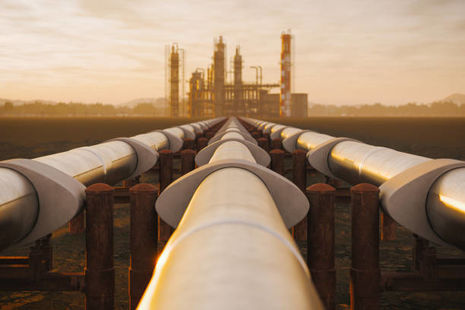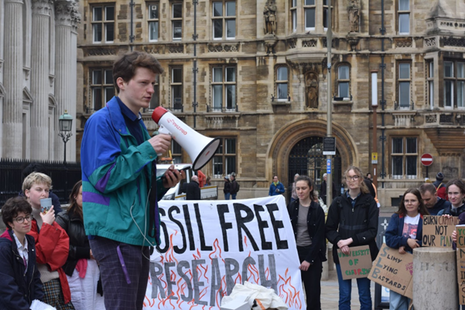How to… film the existential horror of climate anxiety
Heidi Atkins finds the ecopolitical thriller, How to Blow Up a Pipeline, to be a messy but earnest effort

There’s something truly endearing about How to Blow Up a Pipeline. The script borders on cringe-worthy at times, the actors have virtually no chemistry with one another, and the plot takes ‘political film’ to its utmost extreme. When I think about it with my analytical student-journo-brain I feel a compulsion to play the scathing reviewer: “It forgets it’s a film and becomes a political manifesto instead”, “The characters don’t mesh”, “It’s not well thought out”. Yet, buried beneath the ever-critical voice in the back of my head, I cannot help but emotionally connect to the film.
“There is a passionate feeling of youthful climate anxiety injected into the film”
Protests across the country are converging to try to do something about climate change. Activists gathered outside the Senate House here in Cambridge just weeks ago, begging for divestment from oil companies by the University. This is not a new ask. It is one that has fallen on deaf ears time and time again and so it’s natural for myself, like many other young people, to feel a frantic terror at the thought of impending climate breakdown.
How to Blow Up a Pipeline is deeply concerned about this generational anxiety. Its story does what it says on the tin, following a group as they blow up a pipeline in Texas, hoping to destabilise the American oil industry. As the film unfolds we are thrown back in time to discover each character’s reasons for involving themselves in the plot. For the most part, they are disturbing and emotionally resonant, and there is some incredible staging as characters interact under the shadow of looming oil plants.

In Theo’s story, she explains that, in areas close to oil refineries and pipelines, people are far likelier to get cancer and other terminal illnesses. Whilst this is an enormous violation of the show-don’t-tell policies that should govern cinema, it is eerie to watch someone say this on the big screen. It possesses a franticness, an urgency, a terror. I felt like I was being screamed at: “LOOK AT HOW SCREWED IT ALL IS! DO SOMETHING!”.
The film primarily centres upon human responses to the climate crisis and, while it has a good go at creating believable characters, the cast of How to Blow Up a Pipeline do not fit together. Many of them are meeting for the first time at the pipeline, so their particular mish-mash energy can be excused, but the few that have met previously still feel as though they were thought of in different rooms by different writers.
The most egregiously out of place character is Logan, who I can only describe as a strained rehash of Pete Davidson’s David in Bodies, Bodies, Bodies. His primary function is to be a Gen-Z-joke-factory, full of such hilarious one-liners as asking his girlfriend to pee on him. It is hard not to envision the writers room scrolling through TikTok to find their ultimate down-with-the-kids-joke.
Considering all this, why did this film stick with me so much? The unpolished feel of the film gives it an emotional resonance that you wouldn’t get from a seasoned director. This is Daniel Goldhaber’s second feature film; Ariela Barer, who writes, produces and stars in the film, is just 24 years old. There is a passionate feeling of youthful climate anxiety injected into the film. In How to Blow Up a Pipeline, I see a reflection of myself and my peers’ fears that we’re teetering on the edge of collapse. It holds up a mirror to the frantic, terrified and desperate reality of climate change.
“Perhaps, we do not have enough time to always create perfect, polished, political work”
All in all, How To Blow Up A Pipeline is an earnest and powerful meditation on youth culture and climate change. Sure, it’s messy and confused, but perhaps this sort of media is the way forward. Perhaps, we do not have enough time to always create perfect, polished, political work. Perhaps there is no more time to always be a First Reformed or a Burning, to craft the perfect artistic response to the climate emergency that is happening now. How to Blow Up a Pipeline is a reflection of the stage of the climate crisis we have entered and, for all its faults, that makes it powerful.
How to Blow Up a Pipeline is in cinemas now.
 Interviews / Lord Leggatt on becoming a Supreme Court Justice21 January 2026
Interviews / Lord Leggatt on becoming a Supreme Court Justice21 January 2026 Features / Are you more yourself at Cambridge or away from it? 27 January 2026
Features / Are you more yourself at Cambridge or away from it? 27 January 2026 News / Reform candidate retracts claim of being Cambridge alum 26 January 2026
News / Reform candidate retracts claim of being Cambridge alum 26 January 2026 News / Stand Up To Racism protests in solidarity with Minneapolis marches28 January 2026
News / Stand Up To Racism protests in solidarity with Minneapolis marches28 January 2026 News / Vigil held for tenth anniversary of PhD student’s death28 January 2026
News / Vigil held for tenth anniversary of PhD student’s death28 January 2026










